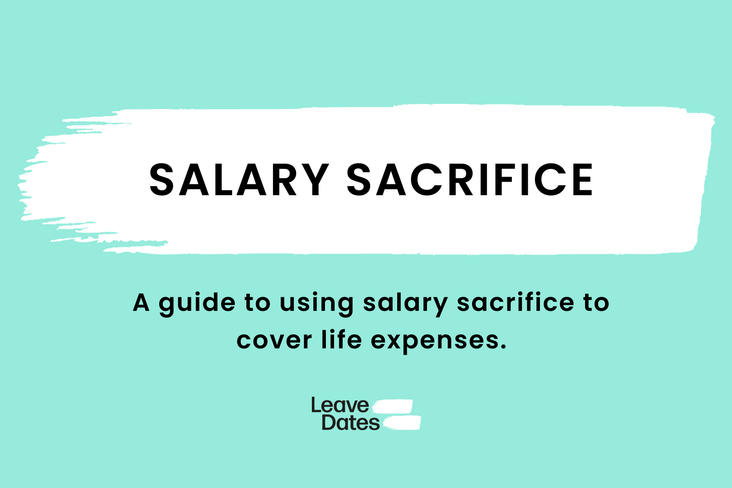Salary. Sacrifice. Without context, these two words together look pretty awful. But don’t stop reading just yet! It’s not how it sounds – promise.
The word ‘sacrifice’ is rarely suggestive of something that you might actually want to do of your own accord. A ‘salary sacrifice’, on the face of it, is maybe even less appealing than the other, more traditional but vastly more morbid understanding of the term.
Fortunately, it’s a lot more palatable than the name suggests and there are various situations where the ‘sacrifice’ implied is less than the cost of not making it. Perhaps the term ‘salary swap’ would be more appropriate, and less likely to have people running for the hills before they’ve heard the deal.
Table of Contents:
- And what is the deal?
- Benefits of salary sacrifice
- The £100k tax tap
- Drawbacks
- How far can you go?
- Conclusion
And what is the deal?
Salary sacrifice means giving up a part of your salary in return for a non-cash benefit. So what exactly do you get? What could be better than cold hard cash?!
There are a few options. Some popular ones are:
- Pension contributions – sacrifice a portion of your salary to contribute more to your pension
- A company car
- Other travel schemes – bike to work, bus passes etc
- Childcare vouchers
- Insurance schemes – health care, dental plans
- Extra leave (known as ‘purchased leave’ or ‘holiday buy-back schemes’)
A salary sacrifice programme is a great perk to offer your staff. It’s effectively a more flexible pay packet, recognising that value comes in many and various forms and that you don’t have to be compensated or rewarded for work via only one currency. ‘Health is wealth’, as we like to say, and salary sacrifice could make it easier for some people to prioritise their mental or physical health, for example by sacrificing salary for extra time off. This could be used for rest and recovery from something specific, or as a mental health ‘top up’.
Benefits of salary sacrifice
Aside from the obvious appeal of the things listed above, why would you opt to receive – or offer – these in place of a salary? Can’t people just pay for them as and when they want them, using their earnings?
Of course they could. But the one drawback of cold hard cash is that it’s taxable. As soon as you get your salary, you pay income tax and national insurance on it. You then only have what’s left to spend on the array of ‘benefits’ you want in your life. If you use some of that post-tax salary to cover, say, a nursery bill or car payment, you’re paying full whack. But if you’re getting some of those things as benefits through a salary sacrifice scheme, that brings down your net adjusted income so you pay less tax. As you’re not paying tax on the money you’re diverting to those benefits (which you would be if you received it as income, and then bought them directly), you’re effectively getting them at a discount.
Essentially, the big draw is a lower tax burden and higher take home pay by paying for certain things out of your earnings before they reach you and become taxable income. Kind of like how expenses in a business come off the profit before any tax is paid. If these are things you are definitely going to buy or have to pay for anyway, it’s a bit of a no-brainer.
The £100k tax tap
This accounting benefit will be more compelling the more you earn. It’s often jokingly thrown around that £120,000 is “the worst salary ever”. Sounds mad, doesn’t it? Well, it’s actually not.
In the UK, there is a phenomenon colloquially known as the £100k ‘tax trap’ where your personal tax-free allowance is reduced by £1 for every £2 you earn over the cap, increasing the total amount you’re paying tax on. Then you lose it altogether if and when you hit £125k, where you revert to a 45% flat rate on all earnings. The result is an effective 60% tax rate (plus 2% NI) if you earn between £100–125,140, this rate is even higher if you live in Scotland.
You also lose access to tax-free childcare, funded childcare hours and child benefit when you are earning at this level, something that can be hugely valuable for families. In fact the value of these benefits can easily exceed the amount of earnings over the threshold, meaning you’d actually be better off earning less.
So though it sounds – and is! – a lot of money, a salary in this range is in fact not very attractive, at least from an accountant’s point of view. If you find yourself in the lucky spot of being offered a pay rise that would take your salary into six figures, maybe extra annual leave would be better? It’s not just a regular salary that could push you into this trap either – be wary of any end of year cash bonuses that might tip you over. It could be more cost effective to take this in another form, if possible. Makes that company car sound even more appealing!
Salary sacrifice pension contributions are a popular way to avoid falling into this trap. As these contributions are taken from gross pay (unlike normal pension payments), you will pay less tax and NI. This is a more tax-efficient way of saving for the future than paying directly into a private pension.
Drawbacks
With any tax-saving scheme, there are of course limits and, sadly, it’s unlikely that your landlord or mortgage lender will accept any kind of salary sacrifice credit. We’ve not had much luck at Sainsbury’s, either.
So you can’t be portioning up all of your salary, pre-assigning it to some benefit or service that you know you’d be spending your wages on. The tax man would not look kindly upon this. But even if it were allowed, it still wouldn’t be a great idea. Salaries are important. Reducing your salary too far could have unintended negative consequences that end up costing you more in the long term.
Your workplace pension, for example, is likely to be determined by your salary. And your eligibility for a state pension requires NI contributions, which only come through earning at a certain level. Maternity/paternity pay is also calculated based on your salary, and again you must be earning at a certain level to be eligible for statutory maternity/paternity pay.
Creditors won’t take salary sacrifice benefits into account when calculating your affordability for credit cards or loans, and especially not mortgages. There are also implications for life insurance. A super-low salary on paper, while saving you money in tax, could cost you more or hold you back in other areas if you don’t get the balance right.
How far can you go?
It’s important to note that salary sacrifice is not the same as (obviously illegal, as well as immoral) tax avoidance. It’s giving up some of your (taxable) salary in return for other, non-taxable (or taxed in a different way/at a later point, in the case of pension contributions) benefits.
This is a contractual agreement between employer and employee that forms part of the employment contract. In that sense, the amount of salary that can be sacrificed is for the two parties to agree. But a salary cannot be reduced below national minimum wage, and as we’ve seen, you should be aware of entitlement thresholds for state benefits that you might want to claim in the future
Conclusion
Salary sacrifice is a great way to make tax savings by effectively paying upfront for things you would be spending your post-tax income on anyway, or to purchase extra time off. For high earners, especially those who would otherwise be at risk of falling into a ‘tax trap’, it can make a big difference to the cash in your pocket. And in a cost of living crisis where definitions of ‘high’ earnings (though not tax brackets) are being rapidly revised, every saving helps!
For lower earners, it can still be a way to make tax efficiencies and streamline your finances to make sure you’re getting the most out of your earnings. Though you’ll want to keep a closer eye on the numbers to ensure you still have a high enough ‘on paper’ salary to meet your needs.
For employers, these days any way in which you can offer your staff greater flexibility is normally a big tick in the right box. As long as they’re not compulsory, or used in lieu of fair wages, salary sacrifice can form part of a good employee benefits package that supports work–life balance and the wellbeing of your staff. And that means a happier, healthier workplace. Just what we all want to see!
The information on this site is general and may not apply to specific circumstances. It should not be considered legal or tax advice. We strive to provide accurate information but cannot guarantee its accuracy. We are not responsible for any losses resulting from reliance on the information on this site.





